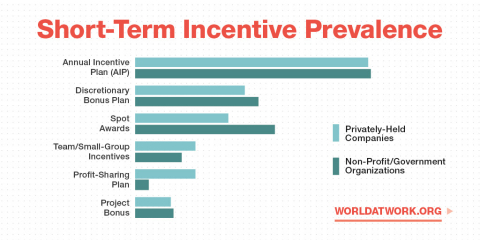WASHINGTON--(BUSINESS WIRE)--Short-term cash incentives and bonus programs continue to dominate the incentive-pay landscape as a vast majority of organizations use and rely on incentive-based pay practices to recruit, motivate and reward employees, according to new research released today by WorldatWork and Vivient Consulting.
“As organizations continue to recognize that incentives are powerful tools, short- and long-term incentive programs remain prevalent across both the public and private sectors,” said Kerry Chou, WorldatWork senior practice leader for compensation. “By linking compensation programs to cash and long-term incentives, organizations can recognize the behaviors and complexities of today’s multigenerational workforce, enabling them to create and sustain improved employee performance and organizational success.”
“While cash continues to dominate long-term incentives at private companies, we are seeing an uptick in the use of real equity in the form of stock options,” said Bonnie Schindler, partner at Vivient Consulting. “In addition, nonprofits and government organizations report their annual incentive plans are more effective than their for-profit counterparts — a sign that incentives are leveling the playing field for all organizations competing for top talent.”
The new research compares the pay practices across two sectors; privately-held companies and nonprofit/government organizations. This unique research fills a gap that exists in the marketplace for incentive pay data, especially for non-publicly traded companies.
Key Findings:
Private, for-profit Organizations:
- Between 2013 and 2015, the prevalence of short- and long-term incentive programs remained steady at private companies. Short-term incentives decreased slightly to 94% from 97%, while long-term incentives also decreased slightly to 53% from 56%.
- In 2015, almost 75% of privately held companies with a short-term incentive plan offered at least three programs.
- Annual Incentive Plans (AIPs), the most prevalent short-term incentive plan at private companies, are offered to employees at the exempt, salaried level and above at most organizations.
- At the 75th percentile, the majority of private companies increased their short-term incentive budgets to 12% of operating profit in 2015. They forecast an increase to 14% of operating profit for 2016.
Nonprofit/Government Organizations:
- In 2015, more than 75% of nonprofit and government organizations favored simplicity by offering three or fewer short-term incentive plans.
- While government incentive-pay budgets remain modest, nonprofit budgets have increased significantly. Nonprofit, short-term incentive budgets are starting to approach the levels reported by the private, for-profit organizations.
- More than 80% of nonprofit and government organizations said their AIPs were effective at achieving their objectives.
- Of the nonprofit/government organizations with AIPs in place, 65% reported the programs are used to reward employees while 62% use the incentives to focus employees on specific organizational goals.
About the Surveys:
In November 2015, Vivient Consulting and WorldatWork invited a sample of WorldatWork’s nonpublicly traded members to participate in the “Incentive Pay Practices: Privately Held Companies” survey. Approximately 200 private, for-profit companies responded to the survey, representing manufacturing, consulting, professional, scientific and technical services, finance and insurance, media, software and retail trades. Three-quarters of the responding private, for-profit companies report $100 million to nearly $5 billion in revenue and nearly a third of the respondents are family-owned companies, which was a new demographic question this year.
In addition to the privately held, for-profit survey participants, more than 125 nonprofit and government organizations responded to the survey, representing state, local and federal government entities in addition to charitable or education organizations. In 2013, Vivient and WorldatWork decided to create a special report for these organizations because of the increasing level of interest in short-term and long-term incentive pay practices. This is the second iteration of that report.
The two surveys are available on the WorldatWork website.
2016 Incentive Pay Practices: Privately Held Companies
2016 Incentive Pay Practices: Nonprofit/Government Organizations
About WorldatWork®
The Total Rewards Association
WorldatWork (worldatwork.org) is a nonprofit human resources association for professionals and organizations focused on total rewards strategies. Comprehensive total rewards strategies are designed to attract, motivate, engage and retain a productive workforce and ultimately, enhance organizational results. Professionals engaged in compensation, benefits, work-life effectiveness and total rewards turn to WorldatWork as their leading professional association. WorldatWork and its affiliates provide comprehensive education, certification, research, advocacy and community for members and the broader total rewards community. WorldatWork has more than 70,000 members and subscribers worldwide; over 80 percent of Fortune 500 companies employ a WorldatWork member. Founded in 1955, WorldatWork is affiliated with more than 70 local human resources associations and has offices in Scottsdale, Ariz., and Washington, D.C.
About Vivient Consulting
Motivating Performance Through Rewards
Since 2002, Vivient Consulting (www.vivient.com) has provided independent compensation expertise to board compensation committees, chief executive officers and human resource professionals. Vivient works with public and private companies, and non-profit organizations. Clients represent many different industries, sizes and stages of growth. The firm’s partners deliver high-quality solutions in the areas of compensation strategy, executive pay, incentive-compensation plan design and employment contract negotiations. For more information, please visit our website at www.vivient.com.





